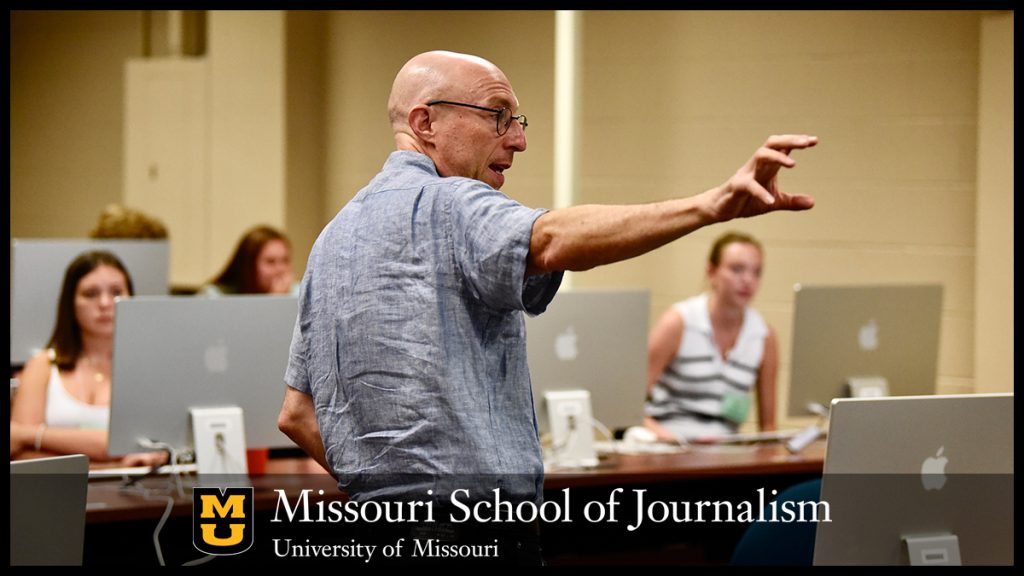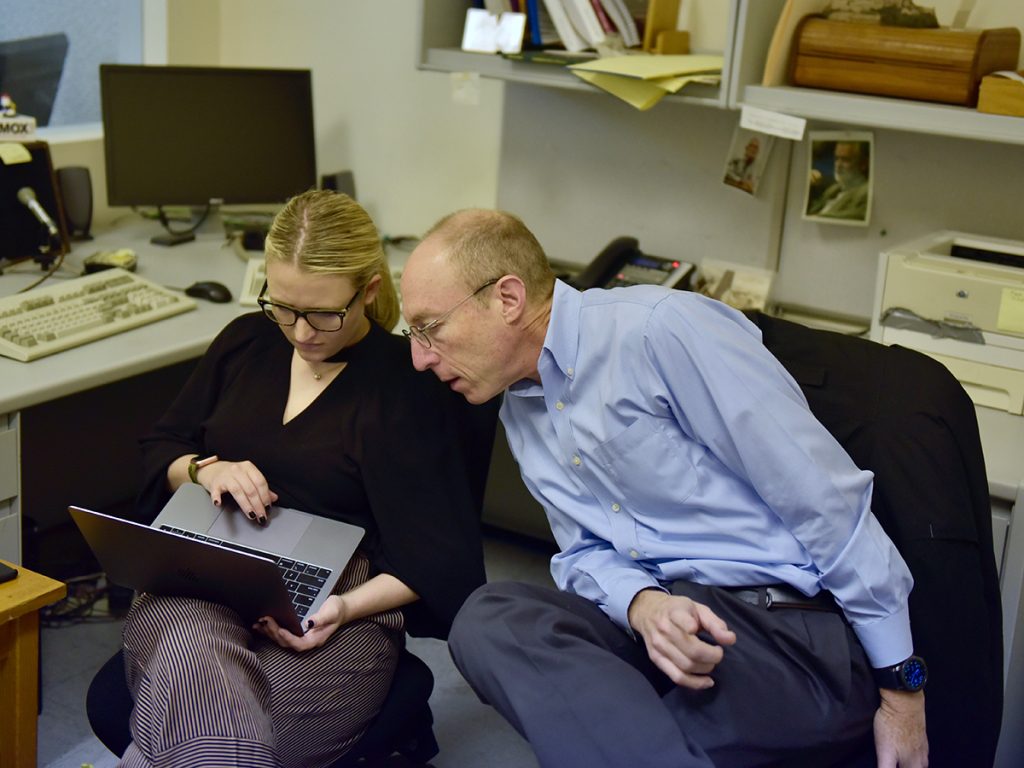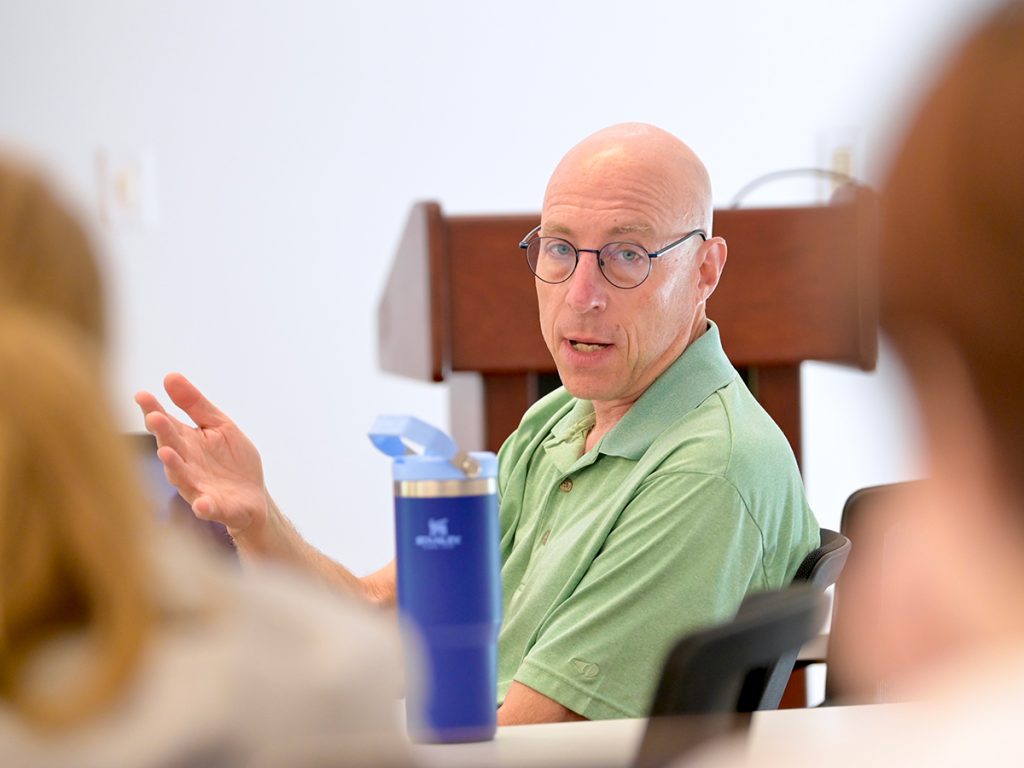Mark Horvit earns Scripps Howard Teacher of the Year Award, the latest recognition for a determined difference-maker

Horvit speaks to a data journalism session during the High School Summer Workshop Program in June 2023.
By Austin Fitzgerald
Photos by Nate Brown
COLUMBIA, Mo. — Mark Horvit, professor and chair of the journalism professions faculty group at the Missouri School of Journalism, has been named Teacher of the Year in the prestigious Scripps Howard Journalism Awards.
The award comes during Horvit’s 17th year at the School of Journalism, where he has developed a reputation for excellence in teaching investigative and statehouse reporting while also thriving in a variety of administrative leadership roles throughout that time.
“Mark is an invaluable leader to Mizzou, the School of Journalism and the industry,” said David Kurpius, dean of the School. “His impact is evident not only in the stories his students produce — students who have gone on to illustrious reporting careers all over the country — but in the ethical rigor and deep critical thinking skills he instills. He is creating the foundation for a new generation of smart, innovative journalists.”
Whether in the classroom or leading projects like the creation and coordination of the Missouri News Network, which unifies the School’s five professional, learning-lab newsrooms in collaboration, Horvit’s success is defined by a distinctive mix of laid-back approachability and driving ambition. He is always striving for a new goal, less out of a sense of obligation than a passion for using his skills to make a difference.
“What keeps me interested is, what’s the next thing that needs to be done?” Horvit said. “What’s the next thing that would be really exciting to tackle, or what’s something with a degree of difficulty we haven’t tried before? It’s the same thing for the journalism side of things or the administrative side.”

Striving forward
That approach dates back to his first job as a reporter at the Panama City News-Herald in 1987.
“I was doing tons of daily stories and I thought, I can do this forever or I can set a goal for myself,” he said. “So in the next six months you say, I want to do one major thing and chip away at it, get it done, then you do another one. Then people start to realize you can do this, so they let you do more of it.”
For Horvit, the “major thing” was investigative journalism, which, after 20 years as a reporter and editor, ultimately led him to his first role at the School of Journalism: executive director of Investigative Reporters and Editors, a nonprofit organization headquartered at the School that supports investigative journalists with training and resources.
Since then — and especially since leaving IRE in 2016 to become a full-time faculty member and lead the School’s State Government Reporting Program — Horvit has been equally influential in teaching and leadership, realms that frequently overlap in his world. Earlier this year, he launched the Statehouse Reporting Project, which connects student-powered statehouse news organizations in more than a dozen states to collaborate on stories that examine regional and national trends in state legislation.
The program not only serves to provide hands-on government reporting experience for students in line with the Missouri Method of learning by doing, but it also helps provide much-needed coverage at a time when a shrinking number of professional journalists cover state governments. As with the Missouri News Network, Horvit said it’s about nurturing the next generation of journalists who will go into the workforce prepared not only for the industry as it currently stands, but for a future they will help revolutionize.
Yet for all the large-scale ways he supports the School of Journalism and its students, he also finds time for more individualized forms of mentorship. Yasmeen Saadi, BJ ’25, was assigned Horvit as a mentor through the Stamps Scholar program and benefitted from his guidance throughout her time at the School, even before taking his investigative reporting course during her senior year.
“He not only teaches the technical skills needed for reporting, but explains how to apply them in a way that is effective and ethical,” Saadi said. “His experience and his down-to-earth mentorship style have helped push me and many other students to strive toward our full potentials.”
This ability to cut through to the most practical, real-world aspect of a lesson comes not only from his genuine desire to help students but from his own experience. In fact, if one looks back at one of his most memorable and formative experiences in journalism, his arrival at the School of Journalism seems almost destined.

A wake-up call in Waco
In the spring of 1993, Horvit was among a throng of journalists from all over the country and the world who descended on Waco, Texas, as a religious group known as Branch Davidians engaged in a prolonged standoff with federal authorities.
As the standoff persisted, Horvit found himself hard-pressed to come up with fresh material for a story. Desperate, he decided to see if a local grocery store would yield a lead.
“I thought, well, let me see if I can just do a feature on what they’re buying for food in the [Branch Davidian] compound or whatever,” he said. “So I go to the grocery store and talk to the produce manager, and it turns out I’m the third journalist who’s tried to interview the produce manager at the grocery store for a terrible story idea. I’m not even the first person to try to do this — that’s how bad it was.”
The standoff notoriously ended in tragedy, and Horvit remembers it as one of his worst assignments. Still, it carries some significance for his teaching in a city like Columbia, where students learn quickly that many of the easiest, most obvious stories have already been done by their peers or by previous classes of students.
“What the Waco experience did was help me figure out that you really have to think differently than everybody else to come up with any kind of story at all, which is a fair challenge to have,” he added. “And that’s true here, too. Any public official or community leader will tell you that they get interviewed all the time. So you have to find the part of the community that nobody’s paying attention to, which is something we should be doing anyway.”
He applies a similar philosophy to his career, in which thinking outside the box and embracing new challenges has kept the spark in his work over the course of nearly 40 years in journalism, education and leadership.
“That’s what journalism always did — I liked it because it was ever-evolving,” he said. “You had bosses, but you could drive the interesting parts of your world. And the School has let me do the same thing.”
Updated: June 13, 2025